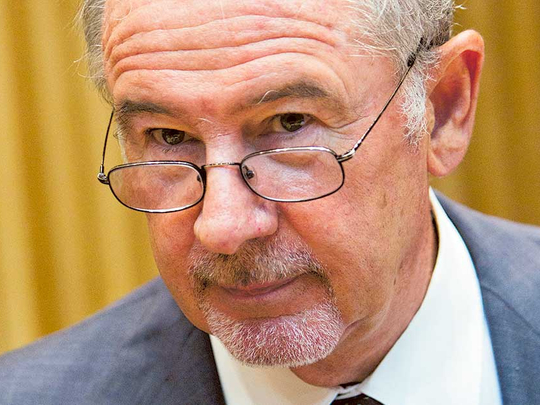
MADRID: Former IMF chief Rodrigo Rato stands trial Monday accused of overseeing a “corrupt system” that helped him and other executives misuse funds on hotels, parties and luxury shopping when he was a Spanish bank boss.
Uncovered in 2013 by a journalist who saw a hacked email alluding to “black credit cards,” the case threatens to land the former economy minister and onetime star of the ruling conservative Popular Party (PP) in jail and with a hefty fine.
It is also another thorn in the PP’s side after repeated failed attempts to form a government following two inconclusive elections, due to a lack of support that is in large part due to corruption scandals sullying the party.
Rato will stand trial with 65 other former executives and board members at Caja Madrid and Bankia, whose near-collapse sparked an EU bailout of Spain’s financial sector.
They are accused of having paid for personal expenses with credit cards put at their disposal by both banks, without ever justifying them or declaring them to tax authorities.
Altogether, they allegedly spent 12 million euros ($13.5 million, Dh49.5 million) between 2003 and 2012 — sometimes splashing out at the height of Spain’s devastating economic crisis.
According to the indictment, Rato maintained the “corrupt system” established by his predecessor Miguel Blesa when he took the reins of Caja Madrid in 2010.
He replicated the system when he took charge of Bankia, a group born in 2011 out of the merger of Caja Madrid with six other savings banks.
Now 67, Rato was economy minister and deputy prime minister in the PP government of Jose Maria Aznar from 1996 to 2004, and he then went on to head up the International Monetary Fund until 2007.
His subsequent career as a banker in Spain was short-lived — from 2010 to 2012 — but apart from the case of the undeclared credit cards, it also led to another banking scandal considered the country’s biggest ever.
Thousands of small-scale investors lost their money after they were persuaded to convert their savings to shares ahead of the flotation of Bankia in 2011, with Rato at the reins.
Less than a year later, he resigned as it became known that Bankia was in dire straits.












